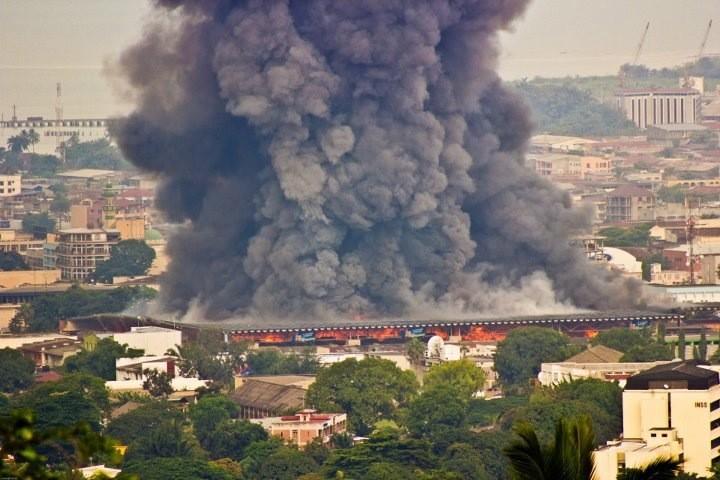I’m supposed to tell you that I’m changing the world. I’m supposed to tell you that I wake up every morning excited to contribute to the movement for global health equity and fall into bed every night exhausted from a deeply psychically satisfying day of doing so.
But I’m not going to tell you those things. I’m going to tell you about a fire.
The fire occurred this past Sunday. It started sometime around 6:30 in the morning in the Bujumbura central market. By 10 AM the entire market was ablaze. Its roof had collapsed, its iron bars melted by flames that leapt upwards of sixty feet in the air.
By 1:30 PM, a helicopter sent by the Rwandan government was at work carrying water from nearby Lake Tanganyika in a bucket to pour over the flames. I watched the helicopter pass overhead. From the ground the bucket looked like a sand pail. How could it do anything to quench the inferno below? Not much, as it turned out. The fire raged on. Occasionally the helicopter missed its target and dumped its cargo of lake water on the policemen and firemen securing the area, to the laughter of the crowd of onlookers. Somehow even in the face of tragedy there was laughter that day.
By 5 PM the fire had abated, though the market continued to smoke. The toll: the 2500 stands that made up the market reduced to black ash, 68 people injured and in need of medical attention, 1 woman dead after rushing into the flames in an attempt to salvage the money she’d kept in her stand – her life’s savings. The economic heart of Burundi up in smoke.
I sat at dinner that night with a close friend of mine who works for the second vice-presidency of the Burundian government, which is responsible for guiding the country’s economic development. We discussed the fire, and lingered on the absurdly small size of the bucket meant to put it out. My friend looked at me. “We’re that bucket,” he said. “The smallest buckets,” I agreed.
I am an “aid worker.” He is a “civil servant.” But in the face of the challenges that surround us, we feel more like tiny buckets, dispersing drops of water on an inferno. Flying in from out of the country to confront problems that we feel helpless to solve.
Like my friend, I have a desk job. Along with my organization’s nine-member National Coordination, I work primarily on reports, proposals, public relations and communications for my organization. As an office worker, I have no stories for you of distributing Toms to refugees or nursing malnourished children back to health.
But SWAA’s National Coordination offices are housed in the same building as SWAA’s Bujumbura clinic. And as I sit in my desk in my third-floor office and listen to small babies bark uncontrollable wracking coughs from deep in their chests on the first floor, or witness beneficiaries who have not had a decent meal in recent memory look on silently as the staff and I eat our work lunch of rice and beans, I have to ask myself: “How is this enough?”
How is what I am doing enough?
And you know what? It’s not. As long as some sixty percent of Burundians are malnourished, it’s not enough. As long as 7,000 people a day continue to contract HIV globally, it’s not enough. As long as one fraction of one year of one life on this planet is lost due to premature death, it’s not enough.
But I’ve realized that “Is it enough?” is the wrong question.
So I’m reframing the inquiry.
What I do is not “enough.” It wouldn’t be “enough” even if I were passing out shoes or spoon-feeding babies. But you know what it is?
Needed.
I’d like to be a fire hose. But even being a bucket is enough to get me out of bed in the morning.

